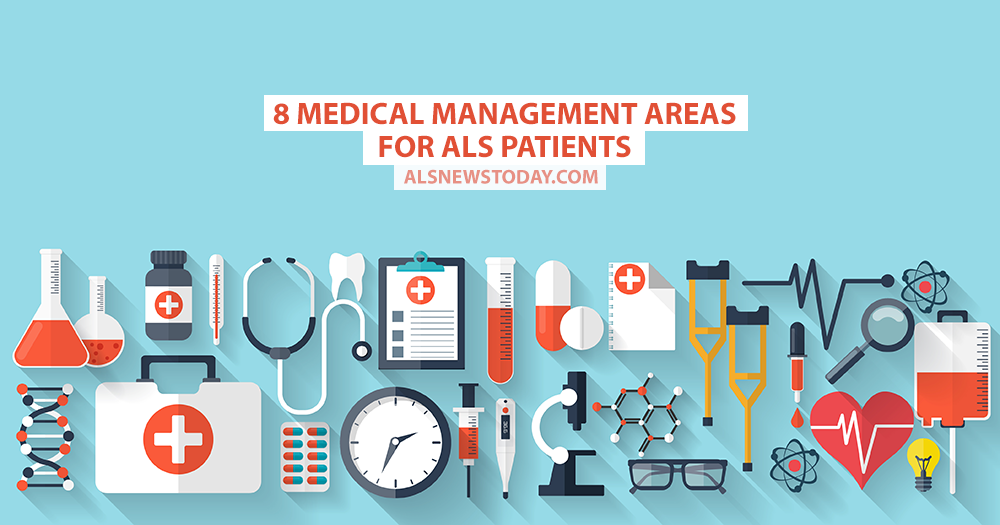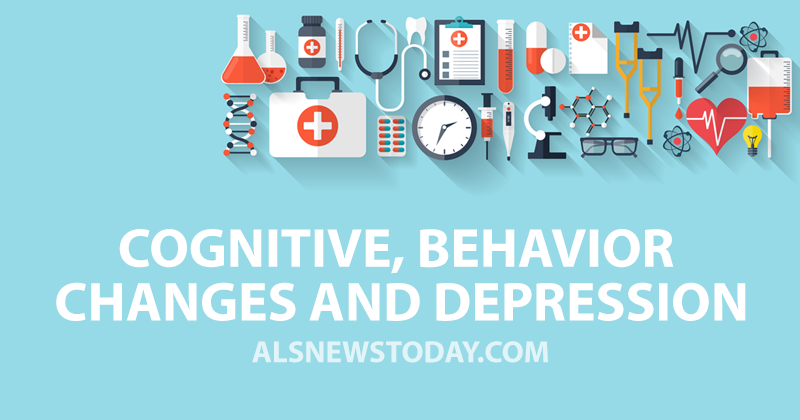8 Medical Management Areas for ALS Patients
Written by |

The advancements in both technology and medicine means that managing symptoms of ALS is now easier than ever before. Doctors are able to make patients much more comfortable and improve their quality of life. There are various areas of medical management needed for people with amyotrophic lateral sclerosis (ALS) and we’ve listed some of the areas here with information from the Muscular Dystrophy Association.
As the disease progresses the diaphragm and chest muscles decline to a point where the patient is unable to breathe unaided. Pulmonologists will routinely test patients to find out how well their lungs are functioning and when they will need a breathing apparatus. Non-invasive ventilators will be used at first which are either tubes inserted into the nostrils or masks that go over the nose and mouth with oxygen delivered through a portable machine. Later, a patient may need tracheostomy surgery to provide a permanent supply of oxygen directly to the lungs.
In addition, patients will need a device to help them cough and clear the airways of built-up mucus.
Read about five common misconceptions about ALS.
The mobility needs of an ALS patient will change as the disease progresses. At first canes and walking frames can be used but at some point, the patient will need a specially adapted powered wheelchair. Devices to help patients in and out of bed may also be required. During the early stages of the disease, tripping hazards will need to be removed and handrails may be required to help with balance.
Physiotherapy will help to strengthen muscles and allow patients to more easily adapt to their changing bodies.
Ten tips for patients newly diagnosed with ALS.
Many ALS patient will experience changes in their cognitive and behavioral patterns, although in most cases the changes are minor and are referred to as frontotemporal dementia (FTD). The usual symptoms of FTD are changes in mood: becoming angry and irritable, lacking clear thinking and showing poor judgment. They may also develop ritualistic habits and other behaviors which are not usual for them, or go through bouts of uncontrollable laughing or crying which is called a pseudobulbar affect (PBA) and can be treated with medication.
There hasn’t been a direct study on the prevalence of depression in ALS patients, but those who do suffer from depression can be treated with therapy and medication.
Read about six ALS therapies to improve quality of life.
As ALS progresses, patients lose the use of the muscles in and around the mouth and the ability to speak. In the early stages of this process, speech therapists can help patients be better understood and help them bank many phrases and words that can be programmed into a communication device, which will allow them to speak in their own voice rather than a computer-generated one.
Find out how assistive technology is helping ALS patients get the most out of life.
As the facial muscles decline, drooling becomes a common problem for many ALS patients. This is handled by wiping the mouth and ensuring the area is kept moisturized to prevent dryness and chafing. For extreme cases, doctors may recommend injections of botox in the salivary glands.
Discover seven facts about ALS you might find interesting.
It is important that ALS patients eat plenty to keep their weight up. They will also need to take in lots of fluids to avoid constipation and to thin mucus. As the disease progresses many ALS patients will lose the ability to chew and swallow, therefore they’ll need a stomach feeding tube (gastrostomy tube). Nutritionists will be able to advise patients on diet and vitamin supplements they may need.
Can exercises help with swallowing for ALS patients? Find out more.
Physiotherapists can work with ALS patients to help them to maintain the use of their hands and fingers for as long as possible. Specialized equipment can also be used to help with everyday tasks to prolong their independence.
Soccer coach mom talks about living with ALS.
There is no cure for ALS, but the drug riluzole (Rilutek) has been found to prolong life for between two and six months.
Other complications of the disease, including muscle and joint pain, cramping, constipation, depression and sleep problems can all be treated with medication.
Read six tips to help you manage your ALS.
ALS News Today is strictly a news and information website about the disease. It does not provide medical advice, diagnosis or treatment. This content is not intended to be a substitute for professional medical advice, diagnosis, or treatment. Always seek the advice of your physician or another qualified health provider with any questions you may have regarding a medical condition. Never disregard professional medical advice or delay in seeking it because of something you have read on this website.













